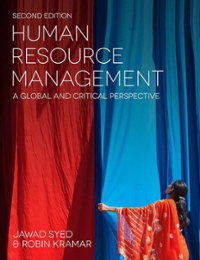Cool International is a UK-based multinational that has expanded rapidly into European, Asian, and South American markets
Question:
Cool International is a UK-based multinational that has expanded rapidly into European, Asian, and South American markets over the past two decades through acquisitions and joint ventures. Their global strategy envisaged a rapid growth in the BRIC countries - Brazil, Russia, India, China - as well as other emerging markets. As a result, the character of the company was fundamentally altered, and it now has far more business by turnover and profit from international activities than in the UK.
Due to the very rapid growth in the pace of internationalisation, shortages of international managers emerged as a significant problem. The implementation of the global strategy was increasingly constrained by these shortages which threatened corporate efforts to expand abroad. As a result the company undertook a strategic review of the requirements of resourcing key positions in international operations. This review suggested that the company should shift away from a reliance on traditional expatriate assignments and towards a more flexible form of resourcing international assignments through the introduction of shorter-term assignments, international commuter assignments (staff commute from home base while family remains at home), and international business travel [see below for details of these forms of international work]. Increased localisation and the establishment of a truly global talent management approach were also considered.
The changes in their global mobility approach were broadly successful and facilitated the company's continued global expansion, and the contribution of international operations to revenues continues to expand. Corporate executives indicate that they feel this success would have been constrained without the introduction of more flexible international staffing arrangements. However, the key problem that Cool International encountered was not related to these workers but to their difficulties in encouraging their managers to accept traditional, longterm foreign assignments. One former expatriate - returning from Rio de Janeiro - put a potential problem into words: 'When I returned, people asked me "How was it on the beach?" And I had worked so hard in Brazil. Now, it seems, I have to prove to my new colleagues and my new boss that this was not just a "jolly". I feel that my career chances have definitely taken a turn for the worse.'
Questions
1 More flexible international staffing may save the company money. Are there any downsides?
2 Why do you think the issues arose with the traditional long-term expatriates?
3 How should the company handle returning expatriates to make them feel that their time abroad has been valued?
Step by Step Answer:

Human Resource Management A Global And Critical Perspective
ISBN: 9781137521620
2nd Edition
Authors: Jawad Syed, J; Kramar Syed, Robin Kramar





